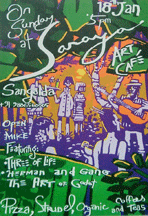First Ecumenical Council of the Catholic Church, held in 325 on the occasion of the heresy of Arius (Arianism). As early as 320 or 321 St. Alexander, Bishop of Alexandria, convoked a council at Alexandria at which more than one hundred bishops from Egypt and Libya anathematized Arius. The latter continued to officiate in his church and to recruit followers. Being finally driven out, he went to Palestine and from there to Nicomedia. During this time St. Alexander published his "Epistola encyclica", to which Arius replied; but henceforth it was evident that the quarrel had gone beyond the possibility of human control. Sozomen even speaks of a Council of Bithynia which addressed an encyclical to all the bishops asking them to receive the Arians into the communion of the Church. This discord, and the war which soon broke out between Constantine and Licinius, added to the disorder and partly explains the progress of the religious conflict during the years 322-3. Finally Constantine, having conquered Licinius and become sole emperor, concerned himself with the re-establishment of religious peace as well as of civil order. He addressed letters to St. Alexander and to Arius deprecating these heated controversies regarding questions of no practical importance, and advising the adversaries to agree without delay. It was evident that the emperor did not then grasp the significance of the Arian controversy. Hosius of Cordova, his counsellor in religious matters, bore the imperial letter to Alexandria, but failed in his conciliatory mission. Seeing this, the emperor, perhaps advised by Hosius, judged no remedy more apt to restore peace in the Church than the convocation of an ecumenical council.
St. Athanasius, may be attributed a preponderant influence
in the formulation of the symbol of
the First Ecumenical Council,
of which the following is a literal translation:
We believe in one God the Father Almighty, Maker of all things visible and invisible; and in one Lord Jesus Christ, the only begotten of the Father, that is, of the substance [ek tes ousias] of the Father, God of God, light of light, true God of true God, begotten not made, of the same substance with the Father [homoousion to patri], through whom all things were made both in heaven and on earth; who for us men and our salvation descended, was incarnate, and was made man, suffered and rose again the third day, ascended into heaven and cometh to judge the living and the dead. And in the Holy Ghost. Those who say: There was a time when He was not, and He was not before He was begotten; and that He was made out of nothing (ex ouk onton); or who maintain that He is of another hypostasis or another substance [than the Father], or that the Son of God is created, or mutable, or subject to change, [them] the Catholic Church anathematizes.
There has long existed a dispute as to the number of the canons of First Nicaea. All the collections of canons, whether in Latin or Greek, composed in the fourth and fifth centuries agree in attributing to this Council only the twenty canons, which we possess today. Of these the following is a brief résumé:
- Canon 1: On the admission, or support, or expulsion of clerics mutilated by choice or by violence.
- Canon 2: Rules to be observed for ordination, the avoidance of undue haste, the deposition of those guilty of a grave fault.
- Canon 3: All members of the clergy are forbidden to dwell with any woman, except a mother, sister, or aunt.
- Canon 4: Concerning episcopal elections.
- Canon 5: Concerning the excommunicate.
- Canon 6: Concerning patriarchs and their jurisdiction.
- Canon 7: confirms the right of the bishops of Jerusalem to enjoy certain honours.
- Canon 8: concerns the Novatians.
- Canon 9: Certain sins known after ordination involve invalidation.
- Canon 10: Lapsi who have been ordained knowingly or surreptitiously must be excluded as soon as their irregularity is known.
- Canon 11: Penance to be imposed on apostates of the persecution of Licinius.
- Canon 12: Penance to be imposed on those who upheld Licinius in his war on the Christians.
- Canon 13: Indulgence to be granted to excommunicated persons in danger of death.
- Canon 14: Penance to be imposed on catechumens who had weakened under persecution.
- Canon 15: Bishops, priests, and deacons are not to pass from one church to another.
- Canon 16: All clerics are forbidden to leave their church. Formal prohibition for bishops to ordain for their diocese a cleric belonging to another diocese.
- Canon 17: Clerics are forbidden to lend at interest.
- Canon 18: recalls to deacons their subordinate position with regard to priests.
- Canon 19: Rules to be observed with regard to adherents of Paul of Samosata who wished to return to the Church.
- Canon 20: On Sundays and during the Paschal season prayers should be said standing.
Study more from New Advent.org
Faith based on devotional attachment to rituals and customs, can easily flounder in a moment of tension, and to preserve the gift God has given us, we should take the trouble to know more, and base our belief on a reasoned foundation. So often, people who fall away from their Faith is due to ignorance, and they tend to throw the baby with the bath. They feel that if they acknowledge Jesus as their Lord, they will be saved. Indeed, He may be so merciful, the will cover up our ignorance with his mercy. But will the enemies of the faith be convinced, if our faith is based on ritualistic practice of our faith? This is why, by looking back at those who came before us, we can gain the strength to believe that we are on a strong wicket.
| < Prev | Next > |
|---|
















